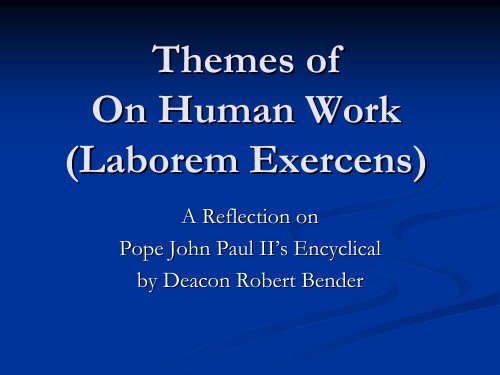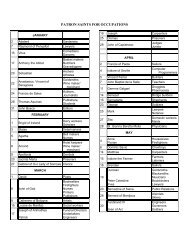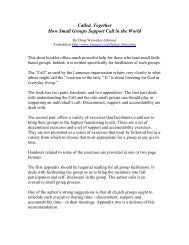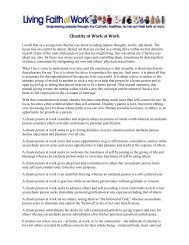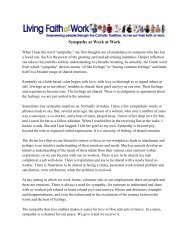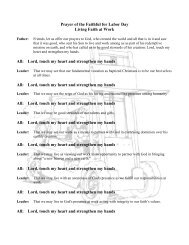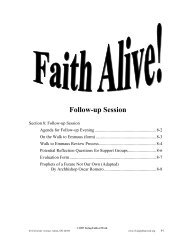Themes of On Human Work (Laborem Exercens) - Living Faith at Work
Themes of On Human Work (Laborem Exercens) - Living Faith at Work
Themes of On Human Work (Laborem Exercens) - Living Faith at Work
Create successful ePaper yourself
Turn your PDF publications into a flip-book with our unique Google optimized e-Paper software.
<strong>Themes</strong> <strong>of</strong><br />
<strong>On</strong> <strong>Human</strong> <strong>Work</strong><br />
(<strong>Laborem</strong><br />
<strong>Exercens</strong>)<br />
A Reflection on<br />
Pope John Paul II’s Encyclical<br />
by Deacon Robert Bender
Introduction<br />
• The immedi<strong>at</strong>e occasion for writing the<br />
encyclical was the 90th anniversary <strong>of</strong> Rerum<br />
Novarum, , Pope Leo XII’s social encyclical <strong>of</strong><br />
1891.<br />
• Drawing heavily upon an earlier work <strong>of</strong> Pope<br />
Paul VI and the thought <strong>of</strong> the Second V<strong>at</strong>ican<br />
Council, Pope John Paul II invites us to<br />
consider the idea <strong>of</strong> a new civiliz<strong>at</strong>ion based on<br />
the spirituality <strong>of</strong> work.
In a nutshell<br />
• The encyclical calls upon Christians to regard<br />
their work as sharing in God’s s own cre<strong>at</strong>ive<br />
work.<br />
• John Paul II entrusts all <strong>of</strong> us with the task <strong>of</strong><br />
deciding how best to cultiv<strong>at</strong>e a civiliz<strong>at</strong>ion<br />
grounded in work which confers dignity upon<br />
all, no m<strong>at</strong>ter one’s s occup<strong>at</strong>ion or pr<strong>of</strong>ession.
Wh<strong>at</strong> are the presuppositions in the encyclical?<br />
• <strong>On</strong> <strong>Human</strong> <strong>Work</strong> examines our oblig<strong>at</strong>ion to<br />
work from a scriptural and faith point <strong>of</strong> view.<br />
• Within this perspective many issues are<br />
discussed around 10 main themes.
Theme 1: The Meaning and Dignity <strong>of</strong> <strong>Work</strong><br />
• <strong>Work</strong> is an active process by which cre<strong>at</strong>ive and<br />
productive persons gain dominion over the<br />
earth and achieve fullness as human beings.<br />
• <strong>Work</strong> plays a significant and necessary role in<br />
our universal call to become human persons.
Theme 1: The Meaning and Dignity <strong>of</strong> <strong>Work</strong> cont.<br />
• <strong>Work</strong> is meaningful only when the human<br />
person’s s dignity is fully appreci<strong>at</strong>ed and when<br />
the activity <strong>of</strong> work is complimented by a certain<br />
receptivity towards life.
Theme 2: The Subjective and<br />
Objective Dimensions <strong>of</strong> <strong>Work</strong><br />
The language <strong>of</strong> the encyclical refers to the person<br />
as the subject <strong>of</strong> work (the subjective dimension),<br />
while the product is the object <strong>of</strong> work (the<br />
objective dimension).<br />
• The<br />
• The distinction is important.<br />
• <strong>Work</strong> becomes dehumanizing and is robbed <strong>of</strong><br />
the Christian meaning <strong>of</strong> work if the focus <strong>of</strong><br />
work is too singularly on productivity.
Theme 2: The Subjective and<br />
Objective Dimensions <strong>of</strong> <strong>Work</strong> cont.<br />
• The subjective and objective dimensions <strong>of</strong><br />
work must be properly integr<strong>at</strong>ed and balanced.<br />
• The subjective dimension <strong>of</strong> work (the dignity<br />
<strong>of</strong> the human person) always has priority over<br />
the objective dimension (productivity).
Theme 3: The Value Scale <strong>of</strong> <strong>Work</strong><br />
• <strong>Work</strong> involves three spheres <strong>of</strong> values:<br />
• (1) a personal value: bringing dignity to the individual;<br />
• (2) a family value: forming the found<strong>at</strong>ion <strong>of</strong><br />
communal life; and<br />
• (3) a societal value: enriching the common good.<br />
• In fulfilling the commandment <strong>of</strong> God th<strong>at</strong> we<br />
work, we contribute to God’s s plan. Our<br />
contribution to this has eternal significance; no<br />
one else can do the work assigned to us.
Theme 4: <strong>Work</strong> and the Mystery <strong>of</strong> Cre<strong>at</strong>ion<br />
• <strong>Work</strong> is inextricably bound up with the mystery<br />
<strong>of</strong> God’s s cre<strong>at</strong>ive activity.<br />
• Each person shares in the wonder <strong>of</strong> cre<strong>at</strong>ion<br />
through work.<br />
• Our every activity is an essential ingredient in<br />
the building <strong>of</strong> the earth and <strong>of</strong> the kingdom <strong>of</strong><br />
God.<br />
• This is our scriptural and theological<br />
understanding <strong>of</strong> work.
Theme 5: A Spirituality <strong>of</strong> <strong>Work</strong><br />
• <strong>Work</strong> is a means by which persons grow in<br />
union with God and particip<strong>at</strong>e in the salv<strong>at</strong>ion<br />
plan for mankind and the world.<br />
• The people <strong>of</strong> God are sc<strong>at</strong>tered throughout<br />
every pr<strong>of</strong>ession and work situ<strong>at</strong>ion, and it is<br />
precisely in th<strong>at</strong> context th<strong>at</strong> they exercise their<br />
spirituality.
Theme 5: A Spirituality <strong>of</strong> <strong>Work</strong> cont.<br />
• To live in God’s s presence <strong>at</strong> work with<br />
sensitivity, awareness, and love is to live a<br />
spiritual life.
Theme 6: <strong>Work</strong> and Question <strong>of</strong> Justice<br />
• <strong>Work</strong> plays a significant role in the justice<br />
question: there can be no justice unless work is<br />
available to people in such a way th<strong>at</strong> basic<br />
rights and duties are protected and promoted.<br />
• The work rel<strong>at</strong>ionship between employer and<br />
employee presents a mutuality <strong>of</strong> duties and<br />
rights.
Theme 6: <strong>Work</strong> and Question <strong>of</strong> Justice, cont.<br />
• Employees’ rights are numerous<br />
• the right to a just wage,<br />
• the right to social benefits th<strong>at</strong> ensure life and health,<br />
• the right to rest,<br />
• the right to pension and insurance,<br />
• the right to suitable working environments,<br />
• the right to strike under certain circumstances,<br />
• the right to form voluntary associ<strong>at</strong>ions,<br />
• the right <strong>of</strong> the disabled to productive activity suited to them,<br />
and<br />
• the right to emigr<strong>at</strong>e in search <strong>of</strong> work.
Theme 6: <strong>Work</strong> and Question <strong>of</strong> Justice, cont.<br />
• The linkage between justice and peace is clearly<br />
articul<strong>at</strong>ed: “...Respect for this broad range <strong>of</strong> human<br />
rights constitutes the fundamental condition for peace in<br />
the modern world ” (16).<br />
• Whenever rights are denied or duties neglected<br />
a pr<strong>of</strong>ound disturbance shakes the life <strong>of</strong><br />
individuals and society <strong>at</strong> large.
Theme 7: <strong>Work</strong> and Various Ideologies<br />
• The encyclical deals with our tendency in<br />
thought and behavior to make one idea or value<br />
the only idea or value. <strong>Laborem</strong> <strong>Exercens</strong> firmly<br />
rejects specific “-isms” th<strong>at</strong> surround work<br />
(Marxism, liberalism, economism, , m<strong>at</strong>erialism).<br />
• Christian theology consistently seeks a balanced<br />
position th<strong>at</strong> protects moral, personal, and<br />
spiritual values.
Theme 7: <strong>Work</strong> and Various Ideologies cont.<br />
• Economic pr<strong>of</strong>it is necessary and justifiable but<br />
never <strong>at</strong> the expense <strong>of</strong> human dignity. M<strong>at</strong>ter<br />
is a part <strong>of</strong> God’s s cre<strong>at</strong>ion, but it is subordin<strong>at</strong>e<br />
to the value <strong>of</strong> the human person.<br />
• The Church uses the insights <strong>of</strong> Scripture and<br />
Tradition in articul<strong>at</strong>ing basic principles to<br />
inform our actions in the work world.
Theme 8: <strong>Work</strong> and Its Abuse<br />
• <strong>Work</strong>, which is meant to humanize and develop<br />
persons, can become destructive when means<br />
become ends.<br />
• The encyclical st<strong>at</strong>es th<strong>at</strong> historically certain<br />
means have usurped the prerog<strong>at</strong>ives <strong>of</strong> the end.<br />
• For Example, technology (a means) has become<br />
the master and the human person (the end) the<br />
slave.
Theme 9: <strong>Work</strong> and the Common Good<br />
• <strong>Work</strong>, through the use <strong>of</strong> n<strong>at</strong>ural and personal<br />
resources, is an essential force to achieve the<br />
common good.<br />
• The pope st<strong>at</strong>es explicitly th<strong>at</strong> the first principle<br />
<strong>of</strong> the whole ethical and social order is the<br />
principle <strong>of</strong> the common use <strong>of</strong> goods.<br />
• A mentality <strong>of</strong> priv<strong>at</strong>ized ownership, if taken too<br />
far, can thre<strong>at</strong>en the realiz<strong>at</strong>ion <strong>of</strong> the common<br />
good.
Theme 10: <strong>Work</strong> and Community<br />
• <strong>Work</strong> builds community by uniting people into a<br />
powerful solidarity.<br />
• Communities are formed<br />
• when there is a common sense <strong>of</strong> identity,<br />
• when there is a commitment to a specific value<br />
system,<br />
• when lives are shared by mutual experience.
In Conclusion<br />
• In conclusion, John Paul II shares th<strong>at</strong> the<br />
Christian finds in work something <strong>of</strong> Christ’s<br />
cross and should accept it in the same spirit.<br />
• In work, too, thanks to the resurrection, we also<br />
find the good news <strong>of</strong> the “new heaven and the<br />
new earth” in which we take part through the<br />
toil <strong>of</strong> our work.
Last Word<br />
• To the extent th<strong>at</strong> work helps to order human<br />
society in a better way, it is indeed rooted in<br />
Christ and it becomes <strong>of</strong> vital concern to the<br />
kingdom <strong>of</strong> God.
Reflection/Discussion Prompts<br />
• Wh<strong>at</strong> theme had particular meaning for or impact<br />
on you? In wh<strong>at</strong> way? To wh<strong>at</strong> effect?<br />
• Why do you think Pope John Paul II wrote this<br />
encyclical? Why should we read it?<br />
• How could you apply the themes to your work life?<br />
• If you applied these themes to your work life, how<br />
would th<strong>at</strong> affect your life?
Thank you for your<br />
<strong>at</strong>tention and<br />
particip<strong>at</strong>ion.


